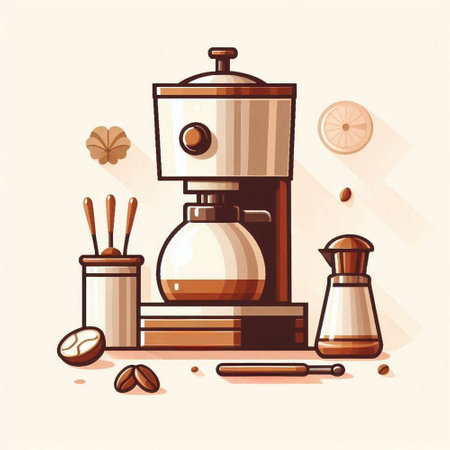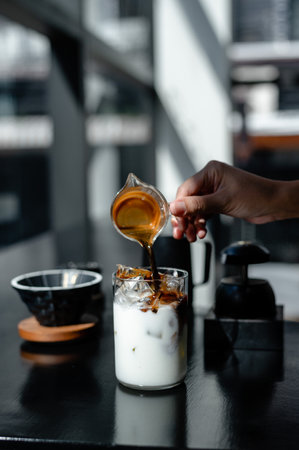Introduction: The Perils of Bitter Coffee in UK Homes
If you’ve ever sipped a cup of coffee at home and winced at its harsh, lingering bitterness, you’re certainly not alone. Across the UK, many coffee enthusiasts encounter this all-too-familiar issue, which often overshadows the pleasure of brewing your own cup. While British cafés and high street chains have refined their extraction methods over years of practice, home setups frequently fall victim to one persistent culprit: over-extraction. This subtle yet critical aspect of brewing can turn even the finest beans into a bitter disappointment, leaving many wondering where they’ve gone wrong. As we delve deeper into this topic, it’s essential to understand why over-extraction is so prevalent in UK households and how it continues to challenge both novice and seasoned home baristas alike.
2. Decoding Over-Extraction: What It Means for Your Brew
Understanding the technical side of over-extraction is crucial for any UK coffee enthusiast striving for a balanced cup. In simple terms, over-extraction occurs when water pulls too many soluble compounds from your coffee grounds during brewing. While some extraction is necessary to release the desirable acids, sugars, and aromatic oils, going beyond this optimal point leads to an overpowering bitterness and astringency – far from the smooth, nuanced flavours most British drinkers enjoy.
Technical Breakdown: What Happens During Over-Extraction?
Coffee extraction can be viewed as a timeline. At first, bright acids and fruity notes dissolve; next, sweetness and body develop. However, if the process continues past the sweet spot, undesirable bitter compounds and woody tones dominate. Factors like grind size, brew time, water temperature, and even your brewing equipment’s cleanliness all influence extraction levels.
Typical Signs of Over-Extraction
| Sign | Description | Impact on Flavour |
|---|---|---|
| Bitter aftertaste | A lingering harshness that overshadows other notes | Masking subtle floral or caramel tones often preferred in UK blends |
| Astringency | Dry, puckering mouthfeel similar to strong black tea | Makes the brew less refreshing and more abrasive, diverging from smoother British-style profiles |
| Dullness | Lack of clarity or vibrancy in taste | Muddies distinctive characteristics prized in locally roasted beans |
Nodding to British Taste Preferences
The classic British palate tends to favour well-rounded, medium-bodied coffees with gentle acidity and clear chocolate or nutty undertones – qualities easily lost through over-extraction. Knowing what to look (and taste) for allows you to keep your home brews aligned with local preferences while avoiding that dreaded bitter cup.

3. Understanding Water Quality and Its British Specifics
When it comes to brewing coffee at home in the UK, water quality plays a surprisingly pivotal role—often as influential as your chosen beans or grinder settings. The majority of British households are supplied with hard water, a local characteristic that directly affects extraction during brewing. Hard water contains elevated levels of minerals such as calcium and magnesium, which can interact with coffee solubles in complex ways. While some mineral content is beneficial for extracting desirable flavours, excessive hardness can lead to over-extraction, drawing out more bitter compounds from your grounds and overshadowing nuanced notes.
Local tap water’s unique mineral makeup can amplify bitterness in your cup if not properly managed. For instance, certain regions like London and Birmingham report some of the highest hardness levels in Europe, meaning your morning brew may taste markedly different compared to one made with softer Scottish water. These minerals not only impact taste but can also affect how quickly or slowly your coffee extracts, potentially pushing your brew into over-extracted territory even when following standard recipes.
To mitigate these effects, many UK enthusiasts opt for filtered water or use jug filters specifically designed for hard water areas. These solutions help moderate mineral content without stripping all flavour-enhancing elements. Additionally, understanding your local tap water’s composition—information often available via your regional supplier—allows you to adjust your grind size, dose, and brew time accordingly. In sum, appreciating the British context of water quality is key to avoiding unwanted bitterness and achieving a well-balanced cup at home.
4. The Role of Grind Size and Brew Methods in UK Kitchens
When tackling bitter coffee at home, it’s crucial to understand how grind size, brewing equipment, and timing interact—especially with the devices most commonly found in British kitchens. Over-extraction is often a result of mismatched variables, leading to brews that are harsh or astringent rather than balanced and flavourful.
Grind Size: Precision Matters
Grind size directly affects extraction. Finer grounds increase surface area, speeding up extraction, while coarser grinds slow things down. In the UK, pre-ground coffee is popular for convenience, but it might not suit all brewing methods. If your coffee tastes excessively bitter, chances are you’re using too fine a grind for your chosen method. Investing in an adjustable burr grinder can significantly improve control over extraction and flavour clarity.
Brewing Equipment: Tailoring Techniques
The cafetière (French press) and AeroPress are staples in many British homes due to their simplicity and versatility. Each device demands a specific grind profile and brewing time to avoid over-extraction:
| Device | Recommended Grind Size | Ideal Brew Time | Common Pitfall |
|---|---|---|---|
| Cafetière | Coarse | 4 minutes | Too fine grind leads to muddy, bitter results. |
| AeroPress | Medium-Fine to Medium | 1–2 minutes (inverted method) | Overly long steeping extracts undesirable bitterness. |
| Drip Machine/Filter | Medium | Depends on machine (3–5 minutes typical) | Mismatched grind clogs filter or produces weak brew. |
Troubleshooting Tips for British Setups
- If you notice bitterness with your cafetière, try coarsening your grind and reducing steep time by 30 seconds.
- AeroPress users should experiment with faster plunges and slightly coarser grinds to avoid lingering bitterness.
- If using supermarket pre-ground coffee, opt for blends labelled as suitable for your device, or ask local roasters for bespoke grinds tailored to your kit.
Brew Time: Don’t Let It Linger
Lingering too long during brewing—even by a minute—can tip the balance towards over-extraction. Use timers (your phone will do) to maintain consistency. For those who enjoy experimenting, logging your timings and results can help you fine-tune each cup to perfection.
The takeaway? A thoughtful approach to grind size and timing, tailored to the devices that fill UK kitchens, is key to avoiding bitter brews and elevating your daily coffee ritual.
5. Troubleshooting and Practical Solutions for Sweeter Cups
If your morning cuppa has been plagued by bitterness, it’s time to take a hands-on approach. Over-extraction can sneak up on even the most diligent UK home brewer, but with some practical tweaks and a touch of investment, you can turn things around and create consistently sweeter, more balanced brews.
Adjust Your Grind Size
The grind of your coffee is often the first culprit when it comes to over-extraction. For most British home setups—be it a cafetière, AeroPress, or V60—aim for a coarser grind if your brew tastes harsh or overly bitter. Finer grinds increase extraction rates, pulling out those unwanted bitter compounds. Experimenting with grind size is a low-cost way to make a big difference.
Tweak Brew Time and Temperature
Longer brew times and higher temperatures can extract more from your grounds than intended. Stick to recommended guidelines: for cafetières, 4 minutes at 92-96°C is ideal; for pour-overs, aim for 2.5-3 minutes. If you’re using boiling water straight from the kettle, allow it to cool slightly before pouring—this small step can help retain sweetness and clarity in your cup.
Invest in Better Gear
While upgrading equipment might seem extravagant, UK home brewers will notice tangible improvements with precision tools. Consider a burr grinder for consistent particle size and digital scales for accurate dosing. Even an affordable temperature-controlled kettle can help avoid the pitfalls of overheating your brew—a worthy investment for those serious about their daily ritual.
Water Quality Matters
Don’t overlook the impact of your tap water’s mineral content. Hard water is common across the UK and can accentuate bitterness. Try brewing with filtered or bottled water; it’s a subtle change that can yield noticeably sweeter results.
Fine-Tune Your Recipe
Finally, remember that balance is key. Start with the standard ratio—about 60g of coffee per litre of water—and adjust according to taste. Keep detailed notes as you experiment; tracking variables will help you zero in on what works best in your unique setup.
By making mindful adjustments and investing where it counts, UK home brewers can sidestep those infamous bitter brews. With every cup, you’ll come closer to finding your perfect balance—one that celebrates both the bean’s natural sweetness and Britain’s love of great coffee.
6. Conclusion: Brewing Better Coffee, The British Way
In summary, mastering the art of home coffee brewing in the UK is all about understanding and preventing over-extraction. By paying careful attention to grind size, water temperature, brew time, and your chosen method—whether that’s a classic cafetière or a modern pour-over—you can sidestep bitterness and achieve a balanced cup every time. Remember, great coffee is not just about precision; it’s also about enjoying the process and embracing a bit of British experimentation in your daily ritual. Approach each brew with curiosity and care, making small adjustments based on taste. Over time, you’ll develop a keen palate and an intuition for what works best in your own kitchen. Let every cup be a step towards refining your technique and celebrating quality coffee at home—one that rivals any high street café right here in the UK.


